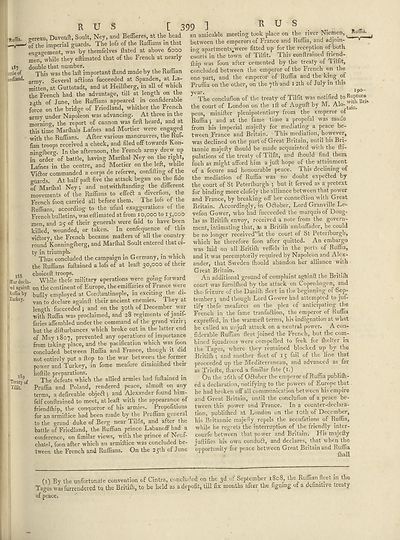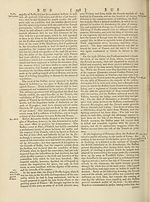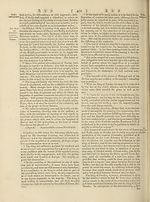Encyclopaedia Britannica, or, a Dictionary of arts, sciences, and miscellaneous literature : enlarged and improved. Illustrated with nearly six hundred engravings > Volume 18, RHI-SCR
(417) Page 399
Download files
Complete book:
Individual page:
Thumbnail gallery: Grid view | List view

1 Raffia.
187 >
little 01
ydland.
R U S [ 399 1 11 U S .
crpreau Davouft, Soult, Ney, and Beffieres, at the head an amicable meeting took place on the river Niernen,
1 !f the imperial guards. The lofs of the Ruffians in that between the emperors of France and Ruffia and adjnm-
pn^ao-ement wa^ by themfelves Rated at above 6000 ing apartments.were fitted up for the reception of both
me§n §while ’they eftfmated that of the French at nearly courts in the town of 1 ilfit. I his eonftrained inend-
Ituflia.
188
vVar deck-
ed againft
luffia by
Turkey.
189
Treaty of
Tilfit.
double that number. , . . „ -
This was the laft important Rand made by the Ruliian
armv. Several aftions fucceeded at Spanden, at La-
mitten, at Guttotadt, and at Heilfiierg, in all of which
the French had the advantage, till at length on the
14th of June, the Ruffians appeared in confiderable
force on the bridge of Friedland, whither the French
army under Napoleon was advancing. At three in the
morning, the report of cannon was firR heard, and at
this time Mar dials Lafnes and Mortier were engaged
with the Ruffians. After various manoeuvres, the Ruf¬
fian troops received a check, and filed off towards Kon-
ninglberg. In the afternoon, the French army drew up
in order of battle, having Marftial Ney on the right,
Lafnes in the centre, and Mortier on the left, while
Viftor commanded a corps de referve, confiding of the
guards. At half paft five the attack began on the fide
of Mar dial Ney •, and notwithflanding the different
movements of the Ruffians to effea a diverfion, the
French foon carried all before them. The lofs of the
Ruffians, according to the ufual exaggerations of the
French bulletins, was efiimated at from xo,ooo to 15,000
men, and 25 of their generals were faid to have been
killed, wounded, or taken. In confequence of this
viftory, the French became maflers of all the country
round Konningfberg, and Mardial Soult entered that ci¬
ty in triumph. _ .
Thus concluded the campaign in Germany, in which
the Ruffians fuflained a lofs of at lead 30,000 of their
choiceR troops.
While thefe military operations were going forward
on the continent of Europe, the emiffaries of France were
bufily employed at Condantinople, in exciting the di¬
van to declare againft their ancient enemies. They at
length fucceeded 5 and on the 3®^ December, war
with Ruffia was proclaimed, and 28 regiments of janif-
faries affembled under the command of the grand vizir;
but the difturbances which broke out in the latter end
of May 1807, prevented any operations of importance
from taking place, and the pacification which was foon
concluded between Ruffia and I1 ranee, though it did
not entirely put a flop to the war between the former
power and Turkey, in fome meamre UimmiRied their
hoftile preparations. ,
The defeats which the allied armies had fuftamed in
Pruffia and Poland, rendered peace, almoft on any
terms, a defireable objedl; and Alexander found him-
felf conftrained to meet, atleaft with the appearance of
friendfhip, the conqueror of his armies. Propofitions
for an armiftice had been made by the Pruffian general
to the grand duke of Berg near R ilfit, and after the
battle of Friedland, the Ruffian prince Labanoff had a
conference, on fimilar views, with the prince of Nei.f-
chatel, foon after which an armiftice was concluded be¬
tween the French and Ruffians. On the 25th of June
ftiip was foon after cemented by the treaty of Tilfit,
concluded between the emperor of the French on the
one part, and the emperor of Ruffia and the king of
Pruflia on the other, on the 7th and 12th of July in this
year.
190
The conclufion of the treaty of Tilfit was notified toRuPn'rs-
the court of London on the ift of Auguft by M. Alo-^.^
peus, minifter plenipotentiary from the emperor of
Ruffia; and at the fame time a propofal was made
from his imperial majefty for mediating a peace be¬
tween France and Britain. 1 his mediation, however,
was declined on the part of Great Britain, until his Bri¬
tannic majefty ftiould be made acquainted with the fti-
pulations of the treaty of TL ilfit, and ftiould find them
Rich as might afford him a juft hope of the attainment
of a fecure and honourable peace. T his declining of
the mediation of Ruffia was no doubt expected by
the court of St Peterftmrgh ; but it ferved as a pretext
for binding more clofely the alliance between that power
and France, by breaking off her connexion with Great
Britain. Accordingly, in October, Lord Granville Le-
vefon Gower, who had fucceeded the marquis of Doug¬
las as Britifli envoy, received a note from the govern¬
ment, intimating that, as a Britilh ambaffador, he could
be no longer received,’at the court of St Peterfhurgh,
which he therefore foon after quitted. An embargo
was laid on all Britilh veffels in the ports of Ruffia,
and it was peremptorily required by Napoleon and Alex¬
ander, that Sweden ftiould abandon her alliance with
Great Britain.
An additional ground of complaint againft the Britifti
court was furnilhed by the attack on Copenhagen, and
the feizure of the Danifti fleet in the beginning of Sep¬
tember ; and though Lord Gower had attempted to juf-
tify thefe meafures on the plea of anticipating the
French in the fame tranfa&ion, the emperor of Ruffia
expreffed, in the warmeft terms, his indignation at what
he called an unjuft attack on a neutral power. A con¬
fiderable Ruffian fleet joined the French, but the com¬
bined iquadrons were compelled to feek for ftielter in
the Tagus, where they remained blocked up by the
Britilh-, and another fleet of 15 fail of the line that
proceeded up the Mediterranean, and advanced as far
as Triefte, {hared a fimilar fate (1.)
On the 26th of Oftober the emperor of Ruffia publifti-
ed a declaration, notifying to the powers of Europe that
he had broken off all communication between his empire
and Great Britain, until the conclufion of a peace be¬
tween this power and France. In a counter-declara¬
tion, publiftied at London on the loth of December,
his Britannic majefly repels the accufations of Ruffia,
while he regrets the interruption of the friendly inter-
courfe between that power and Britain. His majefty
juftifies his own conduft, and declares, that when the
opportunity for peace between Great Britain and Ruffia
{hall
(1) By the unfortunate convention of Cintra, concluded on the 3d of September 1808, the Ruffian fleet m the
Tagus was furrendered to the Britiffi, to be held as adepofit, till fix months after the fignmg of a definitive treaty
of peace.
187 >
little 01
ydland.
R U S [ 399 1 11 U S .
crpreau Davouft, Soult, Ney, and Beffieres, at the head an amicable meeting took place on the river Niernen,
1 !f the imperial guards. The lofs of the Ruffians in that between the emperors of France and Ruffia and adjnm-
pn^ao-ement wa^ by themfelves Rated at above 6000 ing apartments.were fitted up for the reception of both
me§n §while ’they eftfmated that of the French at nearly courts in the town of 1 ilfit. I his eonftrained inend-
Ituflia.
188
vVar deck-
ed againft
luffia by
Turkey.
189
Treaty of
Tilfit.
double that number. , . . „ -
This was the laft important Rand made by the Ruliian
armv. Several aftions fucceeded at Spanden, at La-
mitten, at Guttotadt, and at Heilfiierg, in all of which
the French had the advantage, till at length on the
14th of June, the Ruffians appeared in confiderable
force on the bridge of Friedland, whither the French
army under Napoleon was advancing. At three in the
morning, the report of cannon was firR heard, and at
this time Mar dials Lafnes and Mortier were engaged
with the Ruffians. After various manoeuvres, the Ruf¬
fian troops received a check, and filed off towards Kon-
ninglberg. In the afternoon, the French army drew up
in order of battle, having Marftial Ney on the right,
Lafnes in the centre, and Mortier on the left, while
Viftor commanded a corps de referve, confiding of the
guards. At half paft five the attack began on the fide
of Mar dial Ney •, and notwithflanding the different
movements of the Ruffians to effea a diverfion, the
French foon carried all before them. The lofs of the
Ruffians, according to the ufual exaggerations of the
French bulletins, was efiimated at from xo,ooo to 15,000
men, and 25 of their generals were faid to have been
killed, wounded, or taken. In confequence of this
viftory, the French became maflers of all the country
round Konningfberg, and Mardial Soult entered that ci¬
ty in triumph. _ .
Thus concluded the campaign in Germany, in which
the Ruffians fuflained a lofs of at lead 30,000 of their
choiceR troops.
While thefe military operations were going forward
on the continent of Europe, the emiffaries of France were
bufily employed at Condantinople, in exciting the di¬
van to declare againft their ancient enemies. They at
length fucceeded 5 and on the 3®^ December, war
with Ruffia was proclaimed, and 28 regiments of janif-
faries affembled under the command of the grand vizir;
but the difturbances which broke out in the latter end
of May 1807, prevented any operations of importance
from taking place, and the pacification which was foon
concluded between Ruffia and I1 ranee, though it did
not entirely put a flop to the war between the former
power and Turkey, in fome meamre UimmiRied their
hoftile preparations. ,
The defeats which the allied armies had fuftamed in
Pruffia and Poland, rendered peace, almoft on any
terms, a defireable objedl; and Alexander found him-
felf conftrained to meet, atleaft with the appearance of
friendfhip, the conqueror of his armies. Propofitions
for an armiftice had been made by the Pruffian general
to the grand duke of Berg near R ilfit, and after the
battle of Friedland, the Ruffian prince Labanoff had a
conference, on fimilar views, with the prince of Nei.f-
chatel, foon after which an armiftice was concluded be¬
tween the French and Ruffians. On the 25th of June
ftiip was foon after cemented by the treaty of Tilfit,
concluded between the emperor of the French on the
one part, and the emperor of Ruffia and the king of
Pruflia on the other, on the 7th and 12th of July in this
year.
190
The conclufion of the treaty of Tilfit was notified toRuPn'rs-
the court of London on the ift of Auguft by M. Alo-^.^
peus, minifter plenipotentiary from the emperor of
Ruffia; and at the fame time a propofal was made
from his imperial majefty for mediating a peace be¬
tween France and Britain. 1 his mediation, however,
was declined on the part of Great Britain, until his Bri¬
tannic majefty ftiould be made acquainted with the fti-
pulations of the treaty of TL ilfit, and ftiould find them
Rich as might afford him a juft hope of the attainment
of a fecure and honourable peace. T his declining of
the mediation of Ruffia was no doubt expected by
the court of St Peterftmrgh ; but it ferved as a pretext
for binding more clofely the alliance between that power
and France, by breaking off her connexion with Great
Britain. Accordingly, in October, Lord Granville Le-
vefon Gower, who had fucceeded the marquis of Doug¬
las as Britifli envoy, received a note from the govern¬
ment, intimating that, as a Britilh ambaffador, he could
be no longer received,’at the court of St Peterfhurgh,
which he therefore foon after quitted. An embargo
was laid on all Britilh veffels in the ports of Ruffia,
and it was peremptorily required by Napoleon and Alex¬
ander, that Sweden ftiould abandon her alliance with
Great Britain.
An additional ground of complaint againft the Britifti
court was furnilhed by the attack on Copenhagen, and
the feizure of the Danifti fleet in the beginning of Sep¬
tember ; and though Lord Gower had attempted to juf-
tify thefe meafures on the plea of anticipating the
French in the fame tranfa&ion, the emperor of Ruffia
expreffed, in the warmeft terms, his indignation at what
he called an unjuft attack on a neutral power. A con¬
fiderable Ruffian fleet joined the French, but the com¬
bined iquadrons were compelled to feek for ftielter in
the Tagus, where they remained blocked up by the
Britilh-, and another fleet of 15 fail of the line that
proceeded up the Mediterranean, and advanced as far
as Triefte, {hared a fimilar fate (1.)
On the 26th of Oftober the emperor of Ruffia publifti-
ed a declaration, notifying to the powers of Europe that
he had broken off all communication between his empire
and Great Britain, until the conclufion of a peace be¬
tween this power and France. In a counter-declara¬
tion, publiftied at London on the loth of December,
his Britannic majefly repels the accufations of Ruffia,
while he regrets the interruption of the friendly inter-
courfe between that power and Britain. His majefty
juftifies his own conduft, and declares, that when the
opportunity for peace between Great Britain and Ruffia
{hall
(1) By the unfortunate convention of Cintra, concluded on the 3d of September 1808, the Ruffian fleet m the
Tagus was furrendered to the Britiffi, to be held as adepofit, till fix months after the fignmg of a definitive treaty
of peace.
Set display mode to:
![]() Universal Viewer |
Universal Viewer | ![]() Mirador |
Large image | Transcription
Mirador |
Large image | Transcription
Images and transcriptions on this page, including medium image downloads, may be used under the Creative Commons Attribution 4.0 International Licence unless otherwise stated. ![]()
| Permanent URL | https://digital.nls.uk/193024128 |
|---|
| Attribution and copyright: |
|
|---|
| Description | Ten editions of 'Encyclopaedia Britannica', issued from 1768-1903, in 231 volumes. Originally issued in 100 weekly parts (3 volumes) between 1768 and 1771 by publishers: Colin Macfarquhar and Andrew Bell (Edinburgh); editor: William Smellie: engraver: Andrew Bell. Expanded editions in the 19th century featured more volumes and contributions from leading experts in their fields. Managed and published in Edinburgh up to the 9th edition (25 volumes, from 1875-1889); the 10th edition (1902-1903) re-issued the 9th edition, with 11 supplementary volumes. |
|---|---|
| Additional NLS resources: |
|

